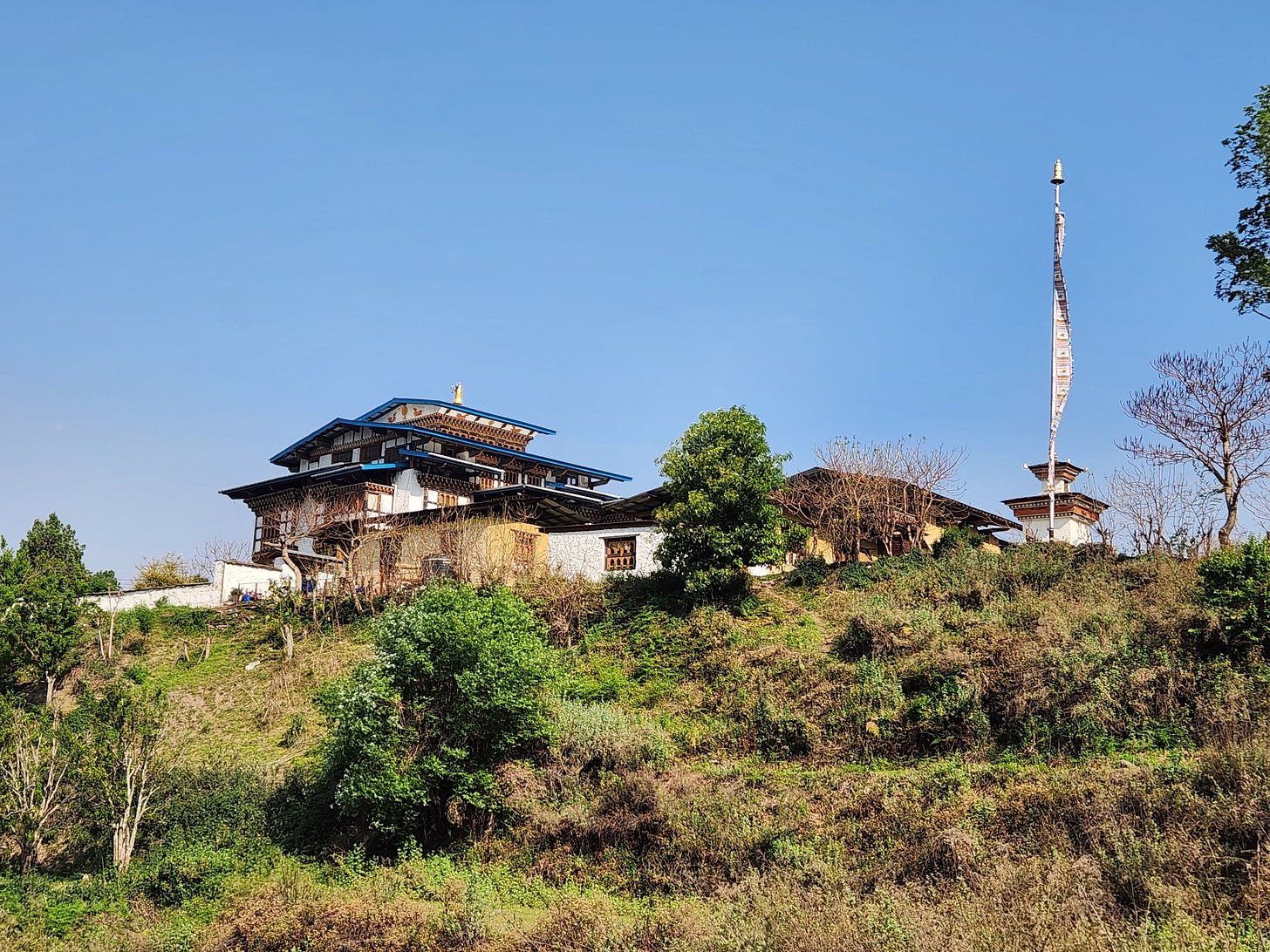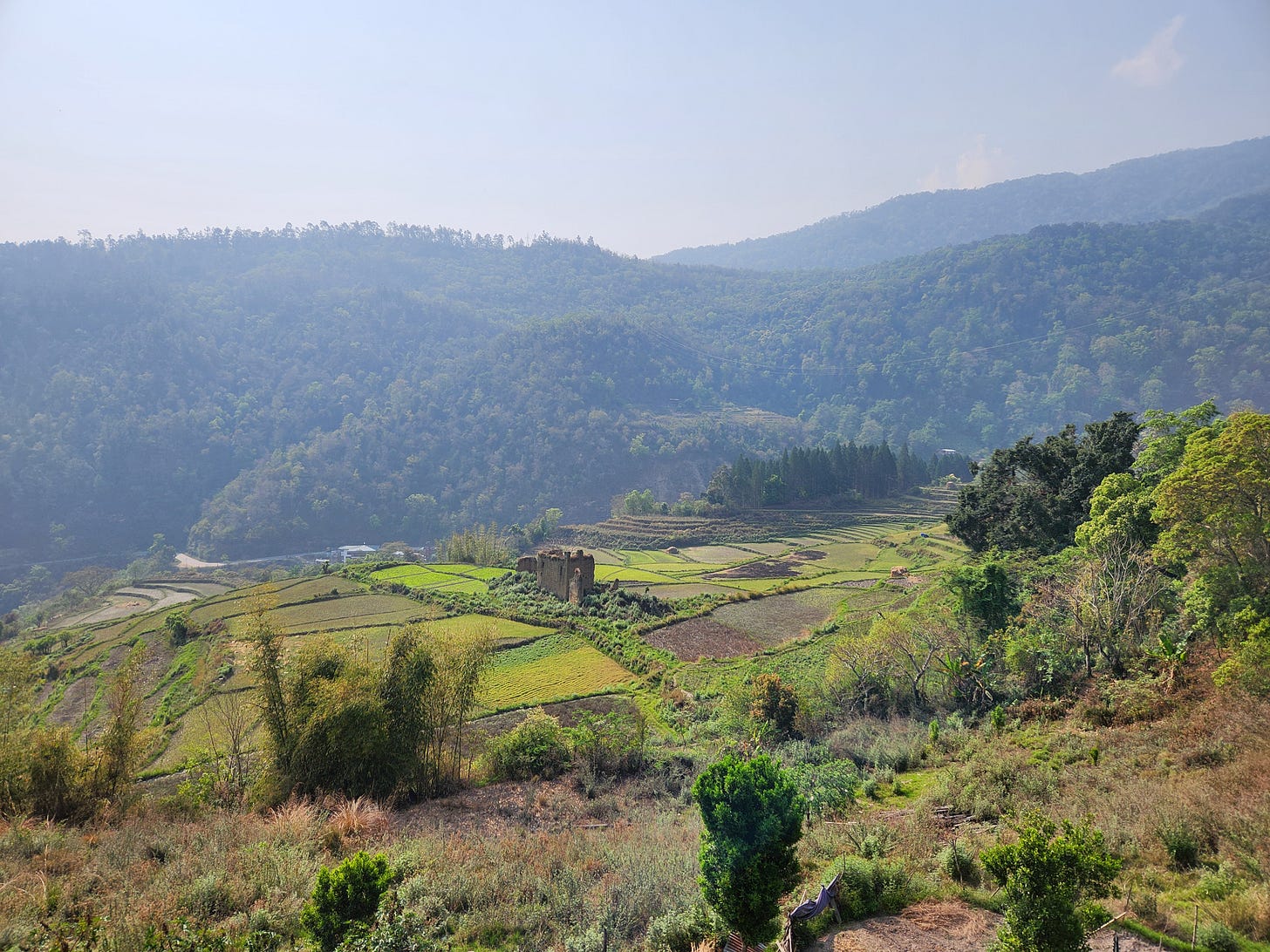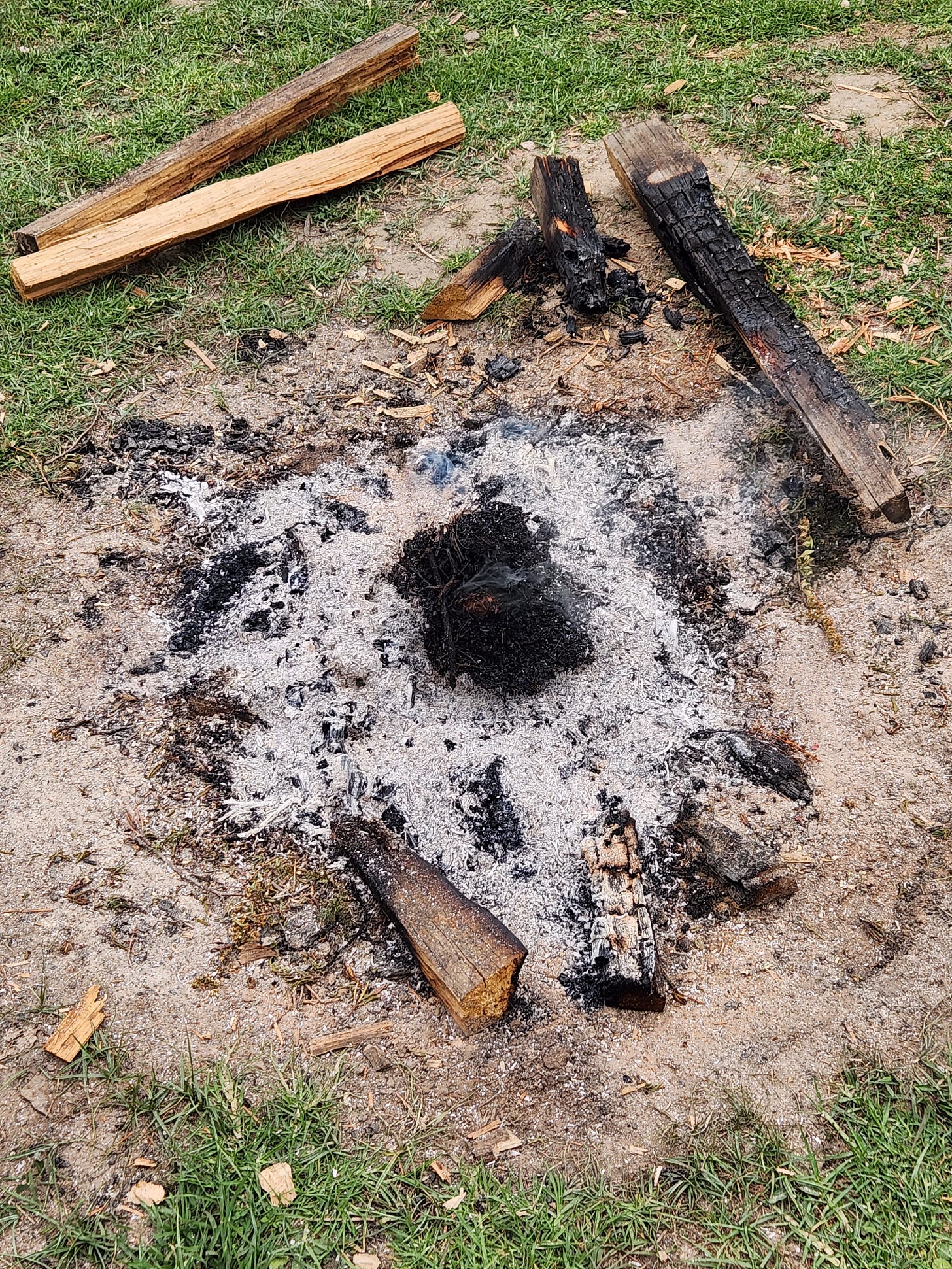Be Present in the Present Because it is All We Have
On learning to live a happy life in the Land of the Thunder Dragon (2/3)
This is the second of a three-part personal reflection on my Impact Safari Bhutan experience! Feel free to read Part 1 and Part 3 if so inspired! 💜
I have been nursing a stubborn head cold since landing home.
The symptoms are only mild that I still have some energy to do small chores and an appetite to keep myself nourished. But they are uncomfortable enough to put a pause on some priority tasks on my to-do list.
I welcome my sickness as it has gifted me the opportunity to rest, to practise being present and being kind to my body, and also the space to process and integrate many shifts and changes – not just from the Bhutan trip, but also since my father died nine months ago. However, I am acutely aware of my privilege. That I have access to food, water, healthcare and a safe environment to recover from a minor ailment, while too many humans are dying and suffering around the world right now.
My Instagram feed alternates posts of Isarel attacking Rafah since Yom HaShoah (Holocaust Remembrance Day – how ironic) with posts of celebrities showing off expensive fashion on the green carpet at the Met Gala on the same day. What a dystopian time we are living in. How do we come to this? What is going to happen next? Is this crisis of capitalism and imperialism going to destroy us completely? It feels like the system is running on fumes and its out-dated engines are sputtering out, and sooner or later it will break down, or worse, explode. What can I do in this unsettling and hopeless time? What would the Buddha do if he lived in our world right now?
Tara Brach, American psychologist and meditation teacher, wrote recently in “What is love asking from us? Reflections on Gaza, the West Bank, and Israel”:
“At this time, this is what seems wise to me, and in all humility, I realize I have my own conditioning, biases, and places of not seeing. As I continue to pay attention, my understanding and views will evolve.
My hope for each of you is that you will pause and keep connecting inwardly to your presence and to your awake and tender heart—that you will consciously include the suffering of all in your heart, and then inquire deeply as to what love wants from you.
We belong to this world; may we be blessed to speak and act from love, may we plant seeds of peace.”
In this tumultuous time of human history, the best thing we can do is to keep calm and continue to meditate, chop wood and carry water. It may sound passive at first, but practising peace internally lays the groundwork to creating and sustaining peace externally. Without peace within, we will continue to be trapped in anger, frustration and despair, and unable to see, hear, think, feel and engage with the reality clearly, calmly and neutrally. In a world that is already stuffed with unimaginable suffering, our most important responsibility is to limit suffering and treat everyone and everything in our immediate world with loving-kindness (including ourselves).
When I was in Bhutan, I witnessed among the Bhutanese people their embodiment of Buddhist values. Every person I met exuded a calm and warm energy. Every time when I walked or sat with them, I could feel my body relaxed and grounded. Every conversation was genuine and caring, connecting me deeply with the spirits of this sacred land. The values of humility, kindness and reverence run deep in the Bhutanese culture. This trip has imprinted me with a renewed sense of trust, courage and confidence, despite not knowing what the future holds.
Day 4: Remembering
I did not know how long it took to travel from Thimphu to Punakha. All I knew was we took many bends and turns descending around the mountains and drove past hundreds and thousands of luscious, glorious trees. (Google Maps says it was a 55-km journey that would take approximately an hour and a half by car.)
During my time in Bhutan, I rarely checked the time on my phone. Except in the morning to make sure I joined the meditation class before breakfast and then got onto the bus on time for the day’s program. Well, I did not need to know the time. Everything was so well looked after by the teams from Small Giants Academy and GNH Centre Bhutan. It was freeing not having to follow a regimental schedule or try to maximise my time use so that I did not “waste time”.
It was love at the first sight when we arrived at the Mendegang Heritage Home.
Hand-painted window frames, doors, ceiling and columns. Nostalgic black and white family photos and vintage keepsakes. Delicate handwoven textiles. Butter lamp house in the middle of the garden. Old, giant avocado tree. Big, bright yellow pomelos hanging on the tree. Colourful, glorious spring flowers. Birdsongs I had never heard. Tiers of rice and vegetable fields surrounding the land. A sense of stillness and serenity in the air. It felt like time had slowed down to let me absorb the details of everything.
This traditional Bhutanese house was built by the host’s grandfather in the late 1940’s with a vision of it being not just a safe, comfortable family home, but also a communal place where local villagers gathered and celebrated religious and seasonal festivals together. In the heart of the home, there was a three-level Buddhist temple rooms, dedicated to Maitriya, Shakyamuni and Guru Rinpoche. Another beautiful example demonstrating the importance of family, community and spirituality in Bhutanese culture.
After a hearty home-cooked lunch, we were split into small circles and shared stories about our blood (ancestry), birth (family) and choice (personal journey). We were reminded of the diverse, complex tapestry of human experiences that had shaped our lives and societies today. We made sense of the values, beliefs, and challenges of those who came before us and received wisdom on how we might untangle the interlocking layers of global and local crises in the present. Through opening up about the most intimate and vulnerable details of our lives, we came to recognise this invisible yet vast interconnectedness and interdependence – and the famous phrase of J. S. Mbiti’s came to mind: “I am, because we are; and since we are therefore I am”
When I was listening to everyone’s story, I began to see flashbacks of some long-forgotten parts of my childhood. It seemed like the long-lost inner child that I had been searching for some time was finally coming home, auspiciously in Bhutan.
Day 5: Breaking
Today we spent the morning fasting in silence.
The day, like any other day, started with a guided meditation session. As my peers sat still with their eyes closed, I felt unusually restless and alert. My eyes were scanning every corner and every object in the temple room. My body was fidgeting every few seconds. My ears were ignoring the teacher’s voice. My nose was rejecting the smell of the incense. My mouth was craving for a cup of hot tea. It was the most uncomfortable meditation session I had sat through to date.
Amidst the last attempt to settle my unease by closing my eyes and focusing on my breaths, I vaguely heard our teacher said the word “courage”. Suddenly, something clicked inside me, like a key opening a door that had been kept closed for a long time. The next second, before I knew it, streams of tears were washing down my face. I could feel a big black ball of emotions in my gut and womb turning into waves, crashing against my whole back, engulfing my chest, throat, shoulders and head. I sobbed and sobbed and sobbed for I did not know how long. Not once I tried to make sense of what was happening in my mind. Instead, I let my body do whatever it needed to do. I allowed my heart to feel and release whatever arose. I surrendered.
Some time later, an old Buddhist monk arrived with his student to lead Riwo Sangchoe (mountain smoke offering), a sacred ritual to clear negative energies and karmas, to purify our inner and outer world, to pray for happiness, peace and prosperity for all sentient beings. His low-frequency chanting calmed and settled my body, mind and soul in an instant, like an old tree providing refuge in a wild storm. Following the guidance from our host, we went up to the altar one by one to make an offering. With my eyes still red and swollen, I held up a small dish of flour, leaves and medicinal herbs and prayed to the Buddhas and deities. I softly chanted “May all be happy. May all be well. May all be safe. May all be peaceful and at ease.” Then I went out to the garden and poured the mixture into the fire, watching it transform into thick, white smoke rising and disappearing into the sunshine and blue sky.
After the ceremony, I was so exhausted that I went back to my room to rest. I opened my journal and read the quote I wrote down on the day of my father’s funeral:
"Things falling apart is a kind of testing and also a kind of healing. We think that the point is to pass the test or to overcome the problem, but the truth is that things don’t really get solved. They come together and they fall apart. Then they come together again and fall apart again. It’s just like that. The healing comes from letting there be room for all of this to happen: room for grief, for relief, for misery, for joy." ~ Pema Chödrön
Decline, decay and death are necessary and inevitable parts of life. They cast warnings, brew medicines and make space for new growth, change and creation. The process can be painful, ugly and heartbreaking, and also cathartic, enlivening and healing. There is no need to fear the end of things, whether it is a person, a relationship, a job, a possession, or a chapter in life. Instead, do the opposite – welcome it, lean into it, feel it, dance with it, and make something out of it. Breakdown is the only way to breakthrough, as the butterflies and moths have been telling us this universal truth since the beginning of humanity.
Day 6: Healing
Our last day at Mendegang Heritage Home was all about experiencing the Bhutanese village life.
In the morning, we trekked through the forest to visit a local school. The school consisted of three small houses and two timber shelters, making up three classrooms, a library, toilets, an office, a communal dining hall, and rest areas. Furniture, equipment and supplies were basic, with many repurposed from used household items. Yet every child I met was happy and curious – a testament of a loving and supportive environment nurtured by their teachers and the local community.
My favourite moment was watching a group of four- to five-year-old children lining up and waiting patiently to get their lunch one by one. No pushing. No screaming. No running around distracted. They filled their own cups with water, chose a seat they liked at the communal table, and chatted with their friends over a plate of home-cooked food. There was so much joy, contentment and respect among them. It seemed almost too good to be true. Yet it was real and happening in front of my every eyes. The Bhutanese people demonstrated in real life that it was important and possible to prioritise collective happiness and wellbeing in everything they did and at every stage of life.
In the afternoon, we joined the host and her families in a various traditional activities including archery and khuru (dart game), home cooking, and making butter lamps. Doing recreational and domestic things with people who were not my immediate family was a new experience for me. I grew up in a nuclear family of four that lived a low-key home life and rarely participated in any community activities. I never asked why and just accepted it as the norm. So, I felt awkward at the start, not knowing how I should approach these activities in a group. Interestingly after a while, I relaxed. It did not matter what I did, how much I did, or how well/bad I did, as long as I was fully present in my participation. It felt incredibly soothing and healing to the soul when spending time with the community to do something together, check in with each other, and contribute to something that benefited all – like some fun and laughter, a delicious dinner, and butter lamp offering.
This homestay experience has given me a taste of the true essence of a good life: Be mindful and engaged in both the joy and mundane of everyday life. Live simply, slowly and in sync with the seasons. Be kind, generous and respectful. Look after nature and people. Preserve traditions. Bring the community together. Believe in the Divine. I am so inspired that I am going to incorporate little pieces of Bhutan into my daily life in Australia.
Thank you for reading Part 2 of the three-part personal reflection on my Bhutan trip! Feel free to read Part 1 and Part 3 here if so inspired.
The Mendegang Heritage Home is recently featured in the Nat Geo’s Best of the World – check it out:













Thank you for sharing your experience, Bonnie. I've been curious to hear about how your time was, and this is even more welcoming than I could have imagined!
Thank you for writing this Bonnie. Such a lovely, loving place to visit.